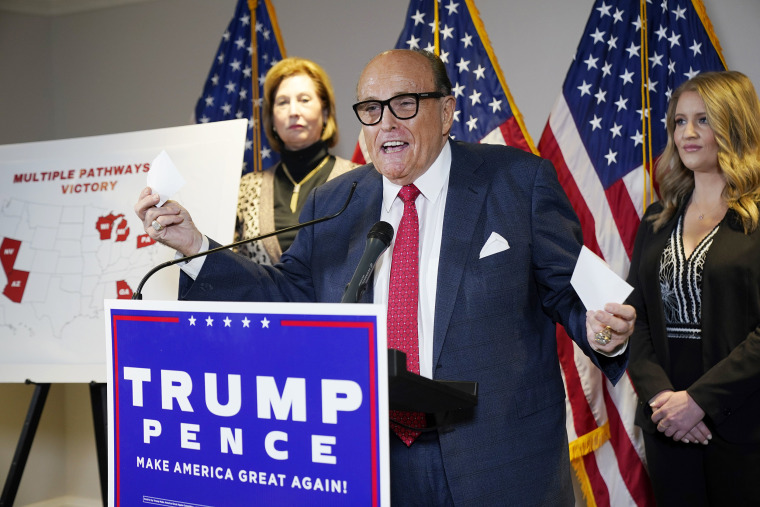Over the course of the year, the public has learned quite a bit about the ways in which Donald Trump and his team tried to overturn the 2020 election results and lied about the Republican's defeat. Some of the revelations have come from investigators, some from journalists, and some former officials who were part of the administration.
But some of the latest information has come from, of all things, a defamation lawsuit.
The New York Times published a striking front-page report this week with a headline that read, "Trump Campaign Knew Lawyers' Voting Machine Claims Were Baseless, Memo Shows." The article noted an infamous press conference in which the then-president's lawyers peddled a bizarre series of election conspiracy theory. It added:
But there was a problem for the Trump team, according to court documents released on Monday evening. By the time the news conference occurred on Nov. 19, Mr. Trump's campaign had already prepared an internal memo on many of the outlandish claims about the company, Dominion Voting Systems, and the separate software company, Smartmatic. The memo had determined that those allegations were untrue.
We know this because of the Coomer vs Trump Campaign case, filed against the Republican's operation by someone who worked for Dominion — the company that pro-Trump conspiracy theorists targeted after President Joe Biden's victory.
The plaintiff and his employer were singled out for highly provocative allegations, which led to a defamation lawsuit. It also, we now know, led to some relevant disclosures, such as the Trump campaign's internal document disproving some of the very claims Trump's lawyers took to the public.
Indeed, the then-president's political team actually examined many of these allegations and privately determined that they simply weren't true. That did not, however, stop other parts of Trump's operation from running with the discredited and nonsensical claims anyway.
As a Washington Post report added, the documents generated by the defamation suit "reveal that as early as mid-November, staffers for the Trump campaign formally vetted and disproved key allegations that later fueled efforts to overturn President Biden's victory."
Or put another way, the public now has documented evidence, not only of Trump trying to overturn the results of an election he lost, but also of Trump's political operation pushing bogus allegations — in multiple forums — the Republican's own team knew to be lies.
At face value, this seems like the sort of detail that's likely to be relevant in the ongoing defamation litigation, but let's not forget that this case may very well have more to offer.
As Rachel noted on the show this week, this same lawsuit has produced depositions from a variety of political players who were also involved in propagating nonsensical claims about the 2020 election. They've already answered questions, under oath, about their role in spreading conspiratorial falsehoods.
Want to bet on whether the depositions will shed even more light on what happened? Watch this space.

